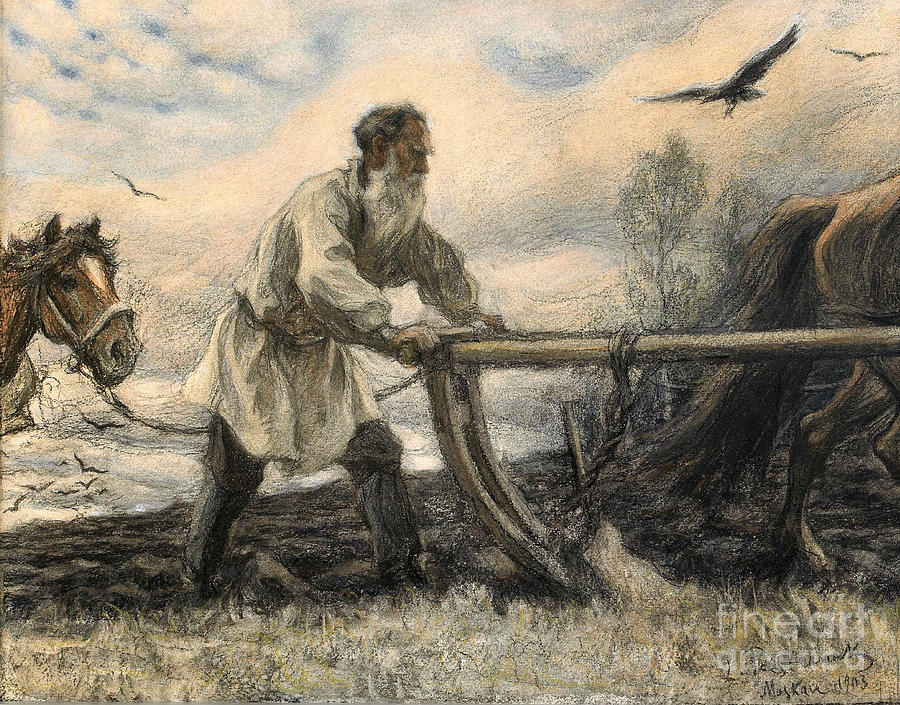Leo Tolstoy Archive
Written: 1899
Source: Anna Karenina, by Leo Tolstoy, translated from Russian to English by Constance Clara Garnett
Transcription/Markup: Andy Carloff
Online Source: RevoltLib.com; 2021

The office consisted of two rooms. In the first room, which had two dirty windows and the plastering on the walls peeled off, a black measuring rod, for determining the height of prisoners, stood in one corner, while in another hung a picture of Christ. A few wardens stood around in this room. In the second room, in groups and pairs, about twenty men and women were sitting along the walls, talking in low voices. A writing table stood near one of the windows.
The inspector seated himself at the writing table and offered Nekhludoff a chair standing near by. Nekhludoff seated himself and began to examine the people in the room.
His attention was first of all attracted by a young man with a pleasant face, wearing a short jacket, who was standing before a man prisoner and a girl, gesticulating and talking to them in a heated manner. Beside them sat an old man in blue eye-glasses, immovably holding the hand of a woman in prison garb and listening to her. A boy in high-school uniform, with an expression of fright on his face, stood gazing on the old man. Not far from them, in the corner, a pair of lovers were sitting. She was a very young, pretty, stylishly-dressed girl with short-cropped, flaxen hair and an energetic face; he was a fine-featured, handsome youth, with wavy hair, and in a prison coat. They occupied the corner, whispering to each other, apparently wrapped in their love. Nearest of all to the table was a gray-haired woman in black, evidently the mother of a consumptive young man in a rubber jacket, who stood before her. Her eyes were fixed on him, and her tears prevented her speaking, which she several times attempted to do, but was forced to desist. The young man held a piece of paper in his hand, and, evidently not knowing what to do, with an angry expression on his face was folding and crumpling it. Sitting beside the weeping mother, and patting her on the shoulder, was a stout, pretty girl with red cheeks, in a gray dress and cape. Everything in this girl was beautiful—the white hands, the wavy, short hair, the strong nose and lips; but the principal charm of her face were her hazel, kindly, truthful, sheep eyes. Her beautiful eyes turned on Nekhludoff at the moment he entered, and met his. But she immediately turned them again on her mother, and whispered to her something. Not far from the lovers a dark man with gloomy face sat talking angrily to a clean-shaven visitor resembling a Skopetz (a sect of castrates). At the very door stood a young man in a rubber jacket, evidently more concerned about the impression he was making on the visitors than what he was saying. Nekhludoff sat down beside the inspector and looked around him with intense curiosity. He was amused by a short-haired boy coming near him and asking him in a shrill voice:
"And whom are you waiting for?"
The question surprised Nekhludoff, but, seeing the boy's serious, intelligent face, with bright, attentive eyes, gravely answered that he was awaiting a woman acquaintance.
"Well, is she your sister?" asked the boy.
"No, she is not my sister," Nekhludoff answered with surprise. "And with whom are you?"
"I am with mama. She is a political," said the boy.
"Maria Pavlovna, take away Kolia!" said the inspector, evidently finding Nekhludoff's conversation with the boy contrary to the law.
Maria Pavlovna, the same beautiful woman who had attracted Nekhludoff's attention, rose and with heavy, long strides approached him.
"What is he asking you? Who you are?" she asked, slightly smiling with her beautifully curved lips, and confidingly looking at him with her prominent, kindly eyes, as though expecting Nekhludoff to know that her relations to everybody always have been, are and ought to be simple, affable, and brotherly. "He must know everything," she said, and smiled into the face of the boy with such a kindly, charming smile that both the boy and Nekhludoff involuntarily also smiled.
"Yes, he asked me whom I came to see."
"Maria Pavlovna, you know that it is not permitted to speak to strangers," said the inspector.
"All right," she said, and, taking the little hand of the boy into her own white hand, she returned to the consumptive's mother.
"Whose boy is that?" Nekhludoff asked the inspector.
"He is the son of a political prisoner, and was born in prison."
"Is it possible?"
"Yes, and now he is following his mother to Siberia."
"And that girl?"
"I cannot answer it," said the inspector, shrugging his shoulders. "Ah, there is Bogodukhovskaia."